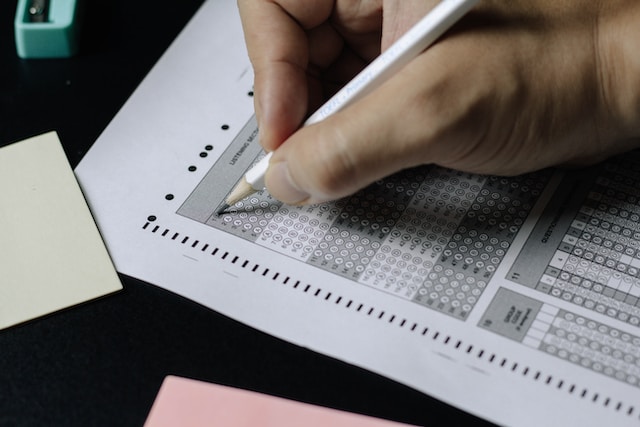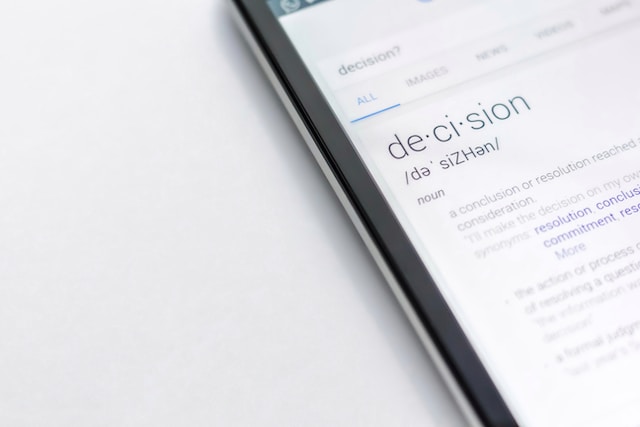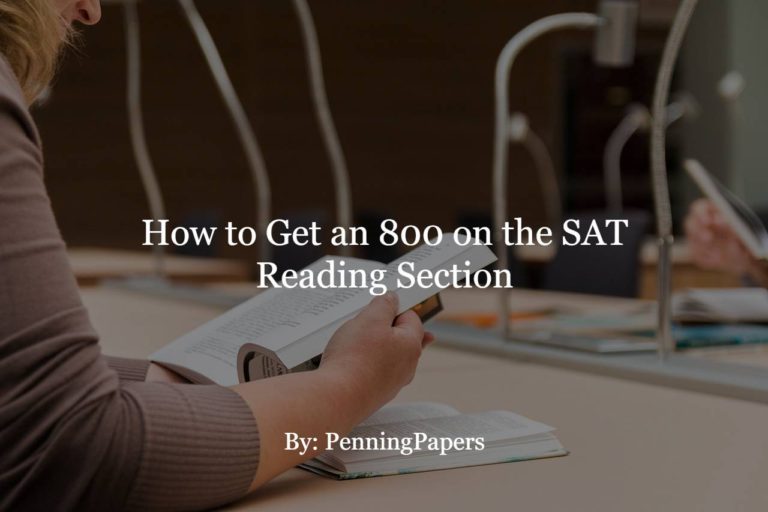Oh boy…
This is going to be a long one. Get comfortable, dear reader. I have a story to tell you:
It’s a story of my journey as a test prep instructor.
Of my challenges teaching students.
Of helping said students earn 1550+ SAT scores.
Of angry parents.
A story of how I learned the BEST and FASTEST method of getting an 800 on the SAT Reading section.
Yeah. I know. Big promises.
But, please: stick with me here. I’m neither being hyperbolic nor trying to insult your intelligence.
Our guide is NOT going to get you an 800 SAT Reading score within 2 days. It’s not going to be smooth sailing on the S.S. 1600. And, even if you do ace the Reading section with flying colors, you have yourself to thank.
It’s NOT just about us; it’s also about YOU.
If you follow our guide and put in the elbow grease, you WILL earn an 800 SAT Reading score.
It takes patience. But, it’ll come.
Okay, without further ado, let’s get started.
Table of Contents
- How I Came to Help Students Earn an 800 on the SAT Reading Section.
- How to Master the SAT Reading Section. What You NEED.
- SAT Reading Section Misconceptions.
- Conclusion
Professional SAT Coaching
- Get a 1500+ SAT Score
- FAST results.
- 6 Weeks Coaching.
- Professional Test Prep Instructors From UPenn, NYU, Cornell, and USC.
- Flexible Payment Budgets
Contact us. We'll get to you within 24 hours.
How I Came to Help Students Earn an 800 on the SAT Reading Section.

I used to work in the Southern California region helping the Asian American population increase their SAT scores.
These days, my team and I teach SAT and ACT all digitally, which you can find more information on or sign up here.
But, when I was first hired to work at my first test prep company, the only requirement was earning a 2200/2400 SAT score (old version) or ACT equivalent. I only really applied because it helped pay for college costs.
It was also conveniently situated right by a food truck that served artery-clogging delicacies like melted cheese poured over Hot Cheetos, Elotes, and “cartoon character” popsicles.

It wasn’t until my first few days working there that I realized earning a perfect score is different from teaching how to get there.
Very different.
In fact, one of the crazy things I’ve found was that EVERYONE wanted to do well. It didn’t matter their race, gender, background, etc.
Were kids forced by their parents to take classes at my workplace? Sure! No one really liked to spend another 2-3 hours at a prep center after class. Students weren’t exactly going out of their own accord.
If anything it was the parents’ idea.
But, did some of them genuinely not care?
Well, from my many years of teaching, I found the answer is… no.
EVERYONE wanted to do well in the SATs because they knew it would help their college decisions, which helped their future careers.
Even those who sat in the back and scrolled through their phones throughout the lecture pretending that their SAT scores didn’t matter… at some point… cared.
But, not everyone —especially in the SAT Reading section.
The ones who truly succeeded were the ones who put in the elbow grease. Not little cool tips and tricks and not my “secret sauce” to getting a perfect score; though, it helped! The biggest factor was putting in enough work.
It’s cheesy but true.
If you really put in the elbow grease, you’ll significantly increase your SAT score regardless of whether it’s the Math or Reading section.

But, that brings another question: who had enough time to work with tutors, get supplementary help, and carve out time for extra studying?
That’s right: those with wealth!
Specifically, it was those who came from wealthy backgrounds who had the resources to succeed.
During my first few years working at the prep center, it was the students whose parents had resources to purchase summer boot camps and other seminars who were most likely to increase their SAT scores.
I wasn’t alone either. My colleagues and peers discovered the same problem.
It even appears to be a systemic issue.
Professor Ezekiel J. Dixon-Roman from the University of Pennsylvania and Professor John J Mcardle found that income played a massive role in performance.
In fact, here’s what Inside Higher Ed had to say about the scoring differences between students of varying income levels.
“In each of the three parts of the SAT, the lowest average scores were those with less than $20,000 in family income, and the highest averages were those with more than $200,000… In reading, for example, the average for those with family income below $20,000 is 433, while the average for those with income of above $200,000 is 570.”
Inside Higher Ed —SAT Scores Drop
This is insane.

Yet… it’s not much of a surprise.
One could infer that those who came from wealthier backgrounds would receive more pressure from their families to earn high scores on the SATs. This is because parents from wealthier backgrounds understand the value of the education-to-career pipeline and are therefore willing to put in the effort to maximize their child’s success.
Having the $$$ to increase your SAT score is the equivalent of buying more “study time” for students. Students seldom if ever studied on their own even if they wanted a good score because they lacked the motivation and discipline. But, parents who purchased sessions with tutors or test prep institutions “bought” practice time for their children.
But, if you think about it, this isn’t exactly that efficacious.
Although students who came from better backgrounds generally performed better than their peers who came from humbler backgrounds, the efficiency of test prep centers was mostly limited.
What I learned through time was that, at the end of the day, the college board has screwed everyone over. The poor can’t get ahead and the rich can get ahead only if they shell out tons of resources for limited success.
Yikes.
Sounds kind of hopeless for the middle class… right?
Well, not all hope is lost.
Let me explain.
Through trial and error, I learned how to TRULY help students earn an 800 on the SAT Reading section without burning through time, money, sweat, and tears.
The best method to earn an 800 on the SAT Reading section is PERSONALIZED tutoring. Hands down.
The keyword here is PERSONALIZED.
Why is personalized tutoring so earth-shatteringly important? I’ll explain in the section below.
How to Master the SAT Reading Section. What You NEED.

Get PERSONALIZED Help… Seriously.

Alright.
If you made it this far in this article, good job. I know I can be verbose. So, here’s a cookie!
Anyway, let’s discuss personalized help. In particular, I’ll be covering why it’s your BEST weapon against the SAT reading section.
Personalized help means getting an individual test prep instructor who knows how to work with you or your child.
In other words, a personalized instructor is going to analyze your characteristics, learning style, strengths, and weaknesses to create a customized teaching method that maximizes your chances of success.
This is not easy.
Most instructors are trained to teach in one method. They are NOT trained to make customized sessions that suit you and your strengths.
That’s why you’ll find wealthy parents jumping between different tutoring centers. Some places are good-ish. And, some places are mediocre with minimal help.
By getting an instructor who can analyze your personal learning style and guide you throughout the process, you can make earning an 800 on the SAT Reading section infinitely easier.
Additionally, you’ll earn a higher SAT score faster; this is great because it frees up time for you to focus on other things like boosting your GPA, taking on volunteer work, seeking research opportunities, or working on personal projects for college admissions.
Now, that brings us to a problem.
How do you find a good personalized coach who can give quality test prep instruction?
What I recommend is scheduling as many free consultations with online tutoring services as you can. Most of the time, if you go to any test prep website, they’ll have a free session available to try out an hour of test prep instruction. Try these out and see what works best. You can start with us too!
If you’ve done so but still can’t find a good coach, the next best bet is your local community. See if there are suitable coaches available willing to give customized tutoring. This is not always going to yield the best results, as you’re effectively working with freelancers with their own teaching styles. But, it can still work!
Time vs Critical Thinking.

This is a method championed by every test prep center and for good reason!
It works!
What you want to do is measure two different skills.
- Time skill.
- Critical thinking skill.
Time skill is your ability to complete a test on time without leaving any questions unanswered.
Critical thinking skill is your, well, critical thinking ability. It’s your ability to analyze a question and conjure the correct answer.
Here’s how it’s done.
- Take a practice test.
- Do the reading section but do NOT time yourself.
- Calculate your score.
- Take a second test.
- Do the reading section whilst giving yourself the regular time.
- Calculate your score.
The first test is your untimed SAT score. The untimed SAT score shows exactly what it says: what your SAT score would be like if time restrictions were not a problem. You can think of your second test as a control group, where it’s just an average test with the same elements.
It’s important to know your untimed SAT score and your regular score because time often plays a massive role in the SAT Reading section. Often, the reason students have a hard time earning an 800 on the SAT Reading section is because of time anxiety, reading slowly, a lack of confidence due to multiple choice questions, and many other time-related problems.
If you scored higher on your untimed SAT Reading section, you probably are struggling with finishing content on time.
If your score stayed the same regardless of whether it was timed or not, you probably are struggling with the critical thinking elements of the test.
In the next two sections, we’re going to cover how to finish the SAT Reading section on time and how to increase your critical thinking skills.
How to Finish the SAT Reading Section Quickly.

To finish the SAT Reading section quickly, you need to do 3 things:
- Learn to read and process content quickly.
- Learn how to avoid overthinking.
- Learn to avoid common traps in the questions.
To read and process content quickly, there are NO tricks.
People often are at a certain reading level and reading speed due to their exposure to long-form text.
Of course, you’ve got your outliers such as students with smart, fast-paced, ADHD minds that process paragraphs too quickly for their own good. However, this is just one of a few exceptions that require careful attention. And, that’s a topic for another time. If you do happen to have ADHD and are struggling with the SAT, feel free to contact us for a free consultation. We’ll provide you with more specific plans for tackling the test that suits your needs.
Generally speaking, you can increase your reading and processing speed through constant exposure to higher-level writing every day. But, there’s a catch.
This is not just about studying. To learn how to read the SAT Reading sections quickly, you need to expose your mind to high-level writing at a constant rate.
There’s actually a very interesting hack I taught my students back when I was still working in-house at the prep center. I told my students to replace their social media apps with Reddit.
The really cool thing about Reddit is that a lot of its content is heavily text-based. So, instead of photos, short-form content, and videos, Reddit allows users to read their content without losing interest. It’s got content that is exciting enough for high-school and college-aged students to enjoy, and it increases their exposure to higher-level sophisticated content.
It doesn’t really have to be all that advanced, either.
One such example I love to share with my students is the r/nosleep subreddit. It’s not Finnegans Wake; but, it’s sophisticated enough in content that it will provide some passive growth in reading comprehension skills for most students.
Next, students are going to need to learn how to avoid overthinking.
This is an easier task than the first one. But, it’s still crucial.
To avoid overthinking during the SAT, you simply need to exercise mindfulness during the test-taking process. So, instead of taking the practice test as you normally do, don’t answer the question yet. Instead, pay attention to what your mind is feeling and the thoughts that start to pop up.
If you can’t do this while taking the test, no biggie. Minimize it to a smaller scale.
Pay attention to what your mind is doing when you eat certain foods.
So, for example, let’s say you hate broccoli but love medium-rare steak. Eat both items and pay attention to what your mind is doing when it consumes each food item. What does your mind say when it eats the broccoli? What about the steak? It sounds obvious; but, by doing this you’ll exercise your mindfulness and become more aware of the thoughts in your head.
Once you become familiarized with mindfulness, you can start to pay attention to your mind during the SAT and actually catch yourself overthinking. It takes a while but it’s worth it!
Now, let’s talk about common traps.
One of the biggest time sinks in the SAT is the traps.
Some of the test questions, and by some we mean most, are going to try to trick you. They’ll lead you into choosing one answer that is almost correct but not truly right. These traps are a big time sink because it takes a lot of mental processing to differentiate between right and wrong answers.
To avoid this, you need to take enough practice tests and write a list of the questions you’ve answered incorrectly. When you record the exact questions you got wrong, write down the full question and the passage it pertains to. That way, you can create an archive or spreadsheet of questions you got wrong.
Not only that, you’ll have an archive of all the types of traps that you fell for in the SAT Reading section. This helps you prepare for them and condition your mind to avoid falling for the same traps during the real test.
So, in summary: increase your reading exposure through articles or easily-accessible text-based social media like Reddit, practice mindfulness exercises to prevent overthinking, and avoid common traps by keeping a record of your incorrect answers and analyzing them.
How to Critically Read.

This one is a bit… hard.
But, it’s going to be a crucial step.
The main reason students can’t perform well in the SAT or earn an 800 on the Reading section is that they lack the necessary critical reading skills to answer the questions.
This is not an easy skill to develop; and, for most people, this takes a long time.
To increase your critical reading skills for the SAT Reading section, you need to treat it like a marathon, not a sprint.
That means you’ll be conditioning your reading comprehension skills every day for a long time. For some, it takes months. For many, it takes years.
If you have the right coach or tutor, it can take weeks; but, even then, that’s being quite generous. Even with our SAT Reading section coaching services, we’re quite lucky if our clients earn an 800 within a few weeks. It often takes at least 1 month before they’re confidently able to earn perfect scores consecutively.
If, however, you wish to learn how to critically read on your own and boost your general critical reading comprehension skills, this is our suggested self-study method.
You’ll need 4 things:
- Your estimated Reading Level.
- An enjoyable book 2 Reading Levels below your range.
- An enjoyable book 2 Reading Levels above your range.
- A pen and paper.
You can find an estimate of your Reading Level with the link provided here.
Once you’ve done that, you want to get books that are a bit easier and a bit harder than your range. So, if you have a 10th-grade Reading Level, you want to get a book that is at the 8th-grade Reading Level and one at the 12th-grade Reading Level.
Once you’ve got this setup established, you need to read each of the books at a MUCH SLOWER pace than what you are used to. Write each of the sentences you come across and deconstruct them by their individual clauses. You’ll be underlining, highlighting, or marking the words based on their independent/dependent clauses, subject/verb, and punctuation usage.
This ensures that you read passages in boxes.
Here’s an example.
This is actually a side project I’ve been working on for fun: it’s a web novel about two siblings who become separated due to an internal conflict gone awry. Trigger Warning: violence.
Pay attention to the passage above. I’ve segregated the clauses by their independent and dependent clauses: independent ones being yellow and dependent ones red.
Often, your critical reading skills are going to improve significantly when you read passages in boxes. This mental and visual compartmentalization makes sophisticated sentences MUCH EASIER to abstract and understand.
Of course, this is a long and tedious process; but, the more you get used to it, the easier it gets to improve your reading comprehension and critical thinking skills.
In addition, there are other exercises such as vocabulary and other creative writing techniques that can actually improve your critical thinking skills in the SAT Reading Section. If you’d like personal coaching to have unique training methods, consider speaking with us for a free consultation and we’ll set you up with a suitable program that fits your needs.
Okay, we know you may be wondering: why not just read practice test passages from the SAT so you can get better at the test directly?
There’s a very good reason for this.
You want to train your critical reading skills sustainably.
Practicing your reading comprehension skills through SAT practice test passages may help you increase your skills quickly in the short term; but, most people can only handle so much test prep practice before they’re burnt out.
It’s essentially a surefire way to guarantee you only improve slightly in a short amount of time before plateauing your score.
Does it mean you shouldn’t practice with the test prep practice tests at all? Absolutely not!
It’s still useful to use the practice tests. But, if you truly want to earn an 800 on the SAT Reading Section, you need to use a combination of reading on your own time and practice through the practice tests. This combination ensures you don’t bore yourself into quitting your practice altogether.
And trust us: it happens far more than you may think.
Even the most motivated students get burnt out; so, there’s got to be some fun sprinkled in. That’s how we do it when we coach our students on the SAT Reading Section!
Analyze Your Faults.

This is where nerds can pull out their spreadsheets and non-nerds can, well, also pull out their spreadsheets.
We’re not kidding, by the way.
One of the most useful things you can do to boost your SAT score from a 700 to an 800 for that final push is to actually get hyper-specific about the mistakes you’ve made in your practice tests.
This means getting a spreadsheet and recording all the questions you’ve made a mistake on and labeling them by their kind of mistake. So, for example, was the mistake made on a “primary purpose of the passage” question? Do you always seem to make mistakes on inference questions?
Record these in the spreadsheet so that you can visualize what mistakes you’re making and prioritize what you need to study.
This is absolutely crucial to boosting your SAT score for the final few points because it helps you focus your energy on the questions that actually matter.
Often, students take practice tests inefficiently because they are practicing for questions that they are already familiar with and good at. They don’t need to practice for them. Instead, they should be focusing on their weaknesses.
By recording your mistakes and assessing them individually using a spreadsheet, you can see what kind of critical thinking questions you’re struggling with and practice for that class of question.
Yes, we know spreadsheets are annoying. Yes, it’s going to be a pain in the butt. But, is it worth it?
Yes, absolutely yes!
SAT Reading Section Misconceptions

The SAT Vocab Debate: Why It’s Necessary and What Everyone Gets Wrong About it.

Ahh… drama.
The world of academics is no stranger to fighting over who is right. Just look at the r/applyingtocollege and r/chanceme subreddits.
It’s the sweet smell of vitriol!
Though, it’s quite rare for fellow test prep instructors to debate over which tactics to use to increase one’s SAT or ACT score. Most methodologies are relatively efficacious.
In fact, many test prep methods can be summarized as: “Whatever floats your boat!”
But, SAT vocab seems to be a BIG debate, and for good reason.
Often, SAT prep instructors are segregated into two camps.
- Those who support SAT vocab studying.
- Those who don’t support it.
I think CollegePanda’s explanation of Ralph Waldo Emerson’s essay is a fantastic example of the importance of vocabulary.
“I’ve even come across people who claim vocabulary is unnecessary and a waste of time. Really? Well, let’s put that to the test. Try reading this Ralph Waldo Emerson essay which showed up on a previous exam and ask yourself if it’s truly possible to understand it without a good vocabulary.”
The College Panda —How to Get an 800 in SAT Reading: How I Did It
But, you’ve also got PrepScholar’s interpretation of flashcard studying in the SATs. (plus their very important point about the test prep industry)
“…test prep programs love teaching you vocab—it feels like they’re teaching you something useful worth your money, but it’s not obvious that vocab actually isn’t helping your score.”
Prep Scholar —How to Get 800 on SAT Reading: 11 Strategies by a Perfect Scorer
Shoutout to both of these creators, by the way. They’ve got great content!
Anyway, here’s the thing: both of these people are correct.
Not only that, it’s BECAUSE they’re both correct that makes studying for SAT vocab confusing.
Here’s the thing:
What you SHOULD do and what you WANT to do are often going to conflict.
You can think of this as the rational brain and the monkey brain.
Do you think the monkey brain is going to like reading flashcards?
Nope!
So, here’s what I’ve done to help students remember the words they memorize.
Fiction writing.
I know it’s cheesy; but, look: if it works, don’t fix it!
I found the best way to get students to learn SAT vocabulary was to use 5 SAT vocabulary words and write fictional stories using them.
This worked for 2 reasons.
- They can let their imagination run wild, and it’s more fun than flashcards.
- The mind also trained itself to find the SAT words useful. The brain wouldn’t memorize things it deems useless. But, if it finds a practical use for it such as writing with it in a sentence, it’ll learn the words because (surprise, surprise) it used it!
Here’s the great thing about learning vocabulary through writing: the mind memorizes things it deems useful. So, it probably doesn’t need to use the word “smorgasbord” since there’s seldom an opportunity necessary to use it. But, the word “articulate” is a very useful word with many applications.
When you write fiction, you’ll find yourself having to use more advanced words to communicate difficult concepts and events. Using these words in your writing tells your brain, “Hey, this word is pretty useful; you should probably remember it next time you need it!”
In addition, fiction writing is infinitely more fun than flashcards. So, while using flashcards may expose you to more words, fiction writing will help solidify them faster.
We recommend taking a list of common SAT Reading Section vocabulary words and writing fiction pieces with them. Take your time with it, and you’ll be surprised how much you remember.
The Efficacy of News Articles and Books: Faults in Implementation.

This is another problem a lot of people come across.
Most people in the SAT tutoring world assume that you need to read news articles and sophisticated books before you are capable of earning an 800 on the SAT Reading section.
Then again, there are others who profusely refute this.
Just like in our previous section about vocabulary, both sides are right.
Reading books and articles is not going to help you increase your SAT score by a lot. And, reading books and articles is one of the best things you can do.
Now, this seems absolutely preposterous… right?
Well, let me explain.
Most people believe they have a set number of hours in a day available for studying for the SAT. However, what many people don’t realize is that there’s actually A LOT more time to study for the SAT than they think.
This is because they have small pockets of time tucked away in between inconspicuous moments in life.
Examples include…
- Riding the bus.
- Waiting in line for takeout.
- Walking to your next class.
- Sitting in the restroom.
- Finishing your work early in class.
- Going for a walk.
- Taking a shower.
These are all periods where 4-5 minutes of mundane thumb-twiddling could be dedicated to studying. And trust us: these 4-5 minute intervals add up.
CGP Grey explains this concept very well in this video for time management for teachers at 5:35.
So, how does this relate to reading books and news articles?
The reality is that books and news articles aren’t going to increase your SAT score like a rocket. They’re going to help in inconspicuous ways such as helping you get familiarized with unconventional sentence structure or having a stronger grasp of vocabulary.
It’s an indirect way of helping you. And, it’s not as strenuous as vocab flashcards or test prep books.
And, that’s EXACTLY why you should be reading articles and books.
You should read articles and books to improve your SAT or ACT Reading score when you’re doing something inconspicuous like going to the restroom or reading before bed. That’s because it’s easy and helps you at an atomic level.
Now, you might say… “But PenningPapers, shouldn’t I just study the practice books since it’s more effective?”
And the answer to that is…
No.
Remember: You don’t have a robotic brain. You’re cursed with a monkey brain. And, the monkey brain HATES studying for the SAT. It hates it with a passion.
But, reading the New York Times?
It’s not video games; but, it’s 100x better than studying the Princeton Review.
So, your monkey brain CAN read the New York Times. It may not be as helpful; but, it’s better than nothing.
And, when you really add things up from a cost-benefit analysis perspective, reading articles and books in your downtime is going to help you a lot more than you think.
Conclusion
In summary, here’s what you need to get an 800 on the SAT Reading Section.
- Get PERSONALIZED help from an experienced test prep coach.
- Measure your SAT score mistakes made from time vs critical thinking.
- Increase exposure to sophisticated English writing.
- Practice sustainable critical reading practice that doesn’t burn you out.
- Analyze your mistakes through tools like spreadsheets to keep organized.
- Train your mind to memorize vocabulary through everyday implementation in writing such as through fiction writing.
- Use news and articles to boost your English skills in small increments.
This is not going to be an easy journey. Remember, the SAT is as much an intelligence test as it is an endurance test. And, you’re certainly going to need to study for this test for a long time before you can earn an 800 on the SAT Reading Section.
Your college admissions chances are going to rely on it. But, know that you’re more capable than you think.
If you’re still struggling to earn an 800 on the SAT Reading section, don’t fret. You’re not the only one. Consider speaking with our expert SAT and ACT test prep coaches through a free consultation. We’ll get back to you within 24 hours, and you’ll be set up with a program that suits your needs best.


